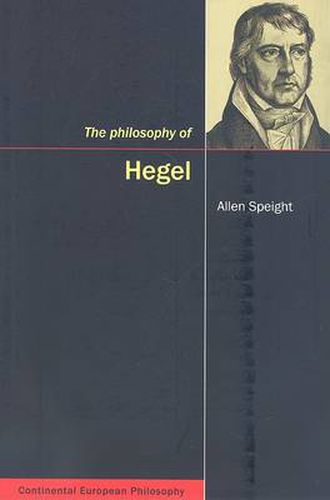Readings Newsletter
Become a Readings Member to make your shopping experience even easier.
Sign in or sign up for free!
You’re not far away from qualifying for FREE standard shipping within Australia
You’ve qualified for FREE standard shipping within Australia
The cart is loading…






Few philosophers can induce as much puzzlement among students as Hegel. His works are notoriously dense and make very few concessions for a readership unfamiliar with his systematic view of the world. Allen Speight’s introduction to Hegel’s philosophy takes a chronological perspective on the development of Hegel’s system. In this way, some of the most important questions in Hegelian scholarship are illuminated by examining in their respective contexts works such as the Phenomenology and the Logic . Speight begins with the young Hegel and his writings prior to the Phenomenology focusing on the notion of positivity and how Hegel’s social, economic and religious concerns became linked to systematic and logical ones. He then examines the Phenomenology in detail, including its treatment of scepticism, the problem of immediacy, the transition from consciousness to self-consciousness , and the emergence of the social and historical category of Spirit . The following chapter explores the Logic, paying particular attention to a number of vexed issues associated with Hegel’s claims to systematicity and the relation between the categories of Hegel’s logic and nature or spirit (Geist). The final chapters discuss Hegel’s ethical and political thought and the three elements of his notion of absolute spirit : art, religion and philosophy, as well as the importance of history to his philosophical approach as a whole.
$9.00 standard shipping within Australia
FREE standard shipping within Australia for orders over $100.00
Express & International shipping calculated at checkout
Few philosophers can induce as much puzzlement among students as Hegel. His works are notoriously dense and make very few concessions for a readership unfamiliar with his systematic view of the world. Allen Speight’s introduction to Hegel’s philosophy takes a chronological perspective on the development of Hegel’s system. In this way, some of the most important questions in Hegelian scholarship are illuminated by examining in their respective contexts works such as the Phenomenology and the Logic . Speight begins with the young Hegel and his writings prior to the Phenomenology focusing on the notion of positivity and how Hegel’s social, economic and religious concerns became linked to systematic and logical ones. He then examines the Phenomenology in detail, including its treatment of scepticism, the problem of immediacy, the transition from consciousness to self-consciousness , and the emergence of the social and historical category of Spirit . The following chapter explores the Logic, paying particular attention to a number of vexed issues associated with Hegel’s claims to systematicity and the relation between the categories of Hegel’s logic and nature or spirit (Geist). The final chapters discuss Hegel’s ethical and political thought and the three elements of his notion of absolute spirit : art, religion and philosophy, as well as the importance of history to his philosophical approach as a whole.